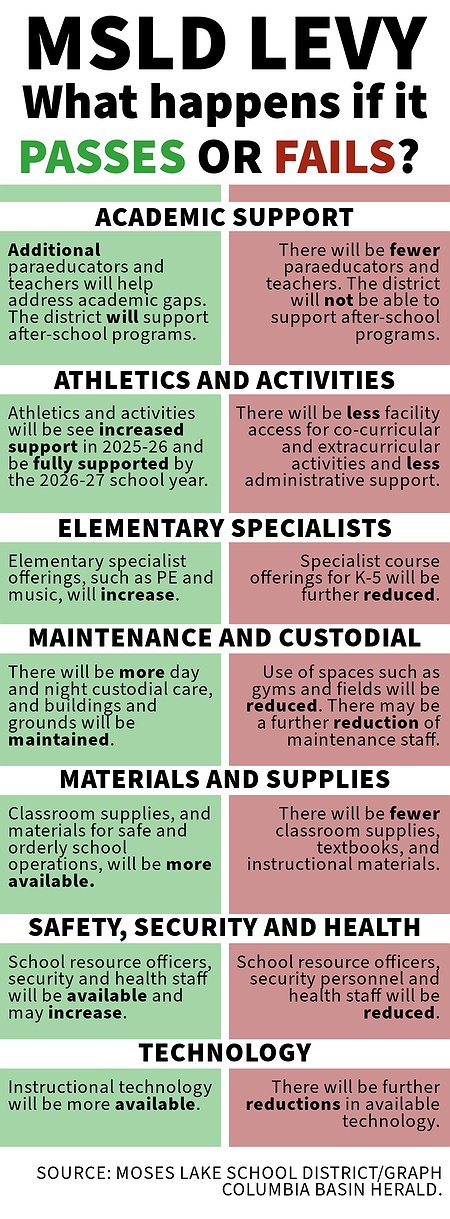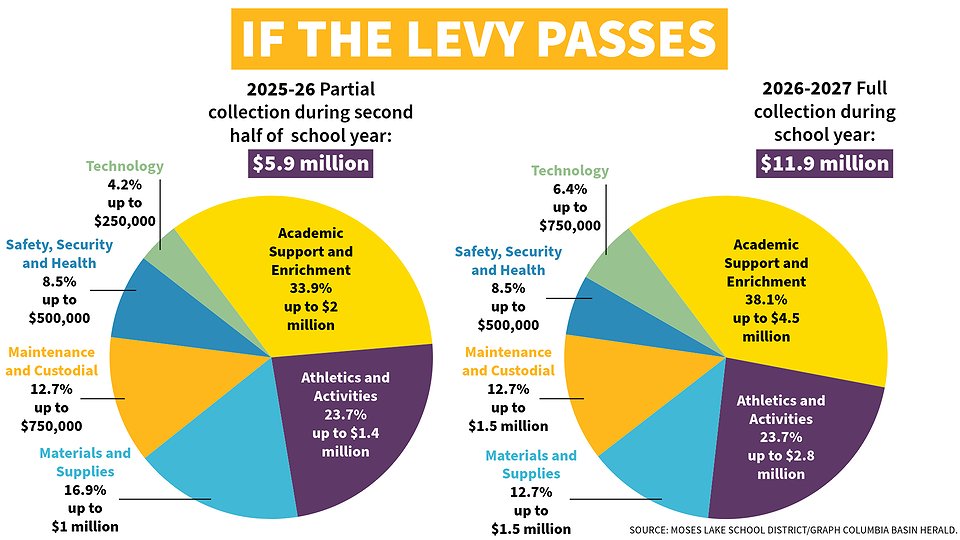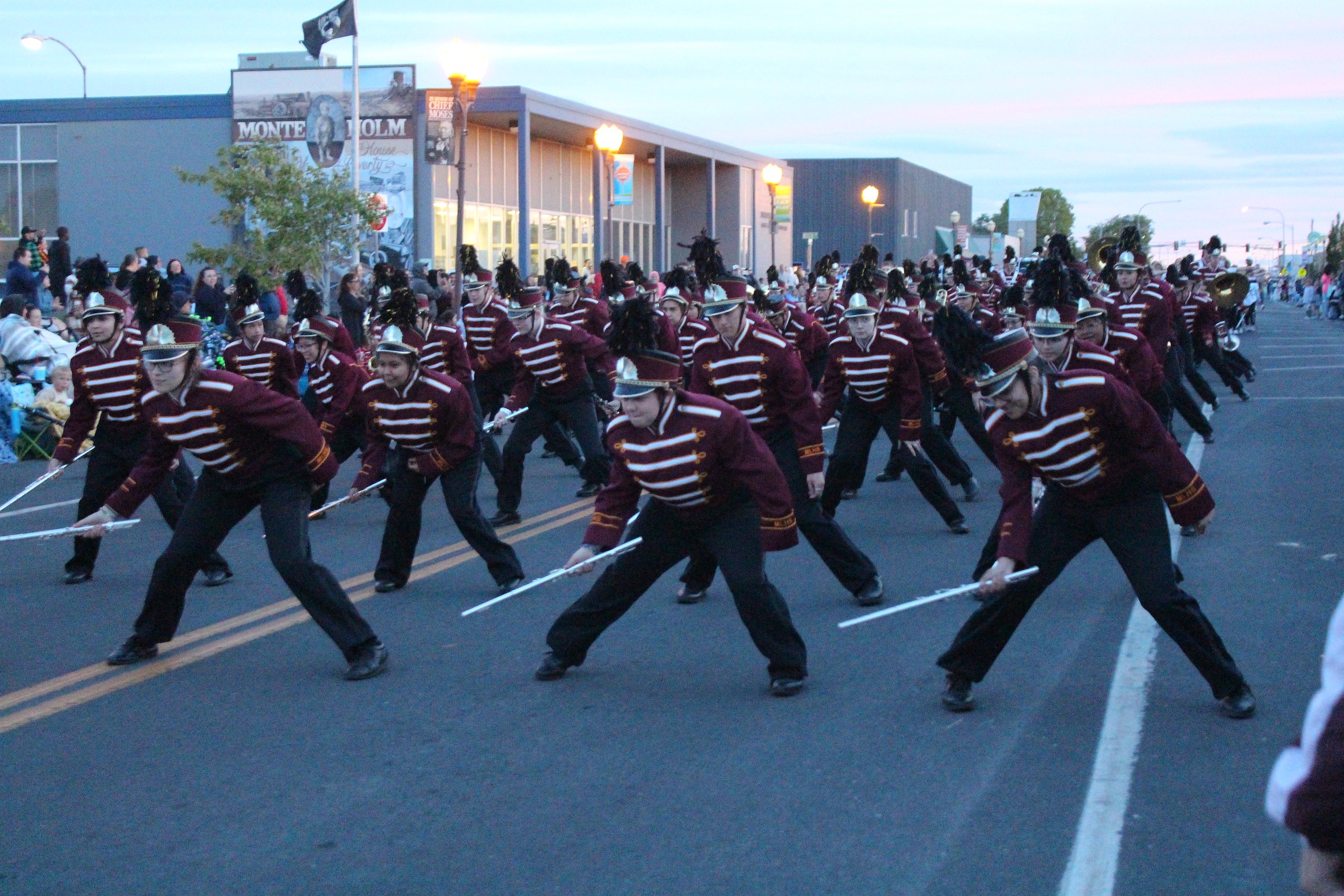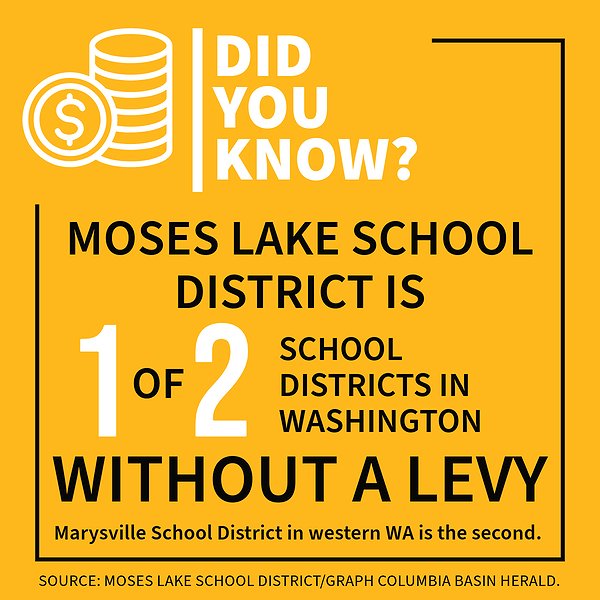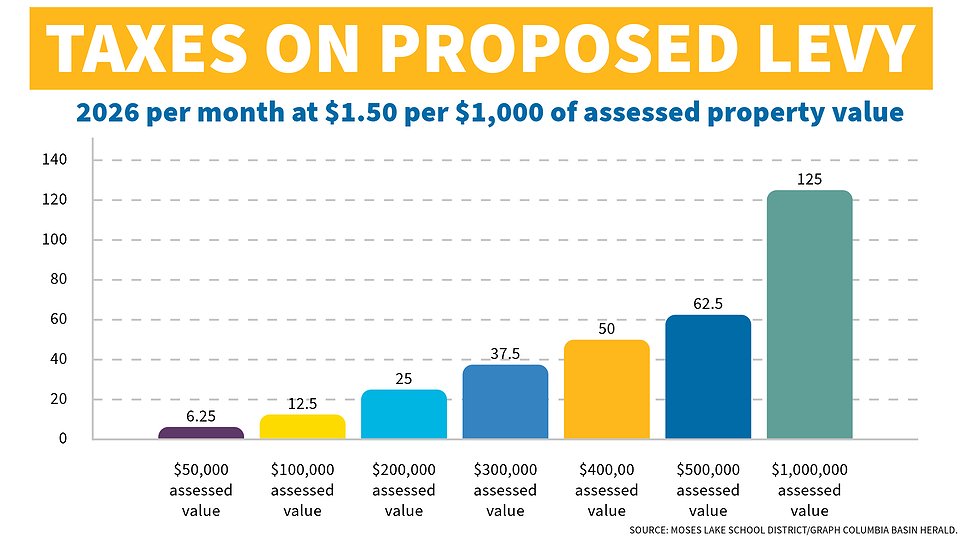Moses Lake School District EP&O levy on February ballot
MOSES LAKE — The Moses Lake School District will submit an educational programs and operations levy to district voters on the Feb. 11 ballot. The levy, using local taxes, provides funding for programs and services beyond the state’s basic education requirements.
“The levy is important to Moses Lake School District, and really all school districts across the state of Washington, because levies are how things that the state considers extra are funded for students,” Superintendent Carol Lewis said. “Some examples of those things would be athletics and activities, specialty courses that kids may take, like AP courses or having music programs in our elementary schools. Those things are not considered part of a basic education from the state, and they are expected to be parts of kids' education.”
Without levy funding, the district may face more potential cuts to these programs, according to Lewis. For this levy, the district is proposing a rate of $1.50 per $1,000 of assessed property value, a reduction from last year’s $2 – which failed with voters twice. This year the Moses Lake School Board passed a resolution in support of the levy, whereas last year, the board did not.
Local Effort Assistance
A key component of the proposed levy is the Local Effort Assistance program, which provides supplemental state funding from Washington’s general fund to school districts that pass a levy.
“I think a lot of people don't realize that when voters are voting whether or not to approve a levy, they're really voting on two separate funding mechanisms,” Lewis said. “The first funding mechanism that they're voting on is whether we're going to levy a local tax on local property. Most people think it is the only thing they're voting on – but how our state has set things up is, if a community approves a local levy, then the state also kicks in a very significant amount of money. That's a way of incentivizing a community to approve a levy.”
The LEA allocation is based on overall property value in communities. The lower the property value the more LEA is provided and vice versa.
“The state's general fund is made up of a variety of tax sources,” Lewis said. “The biggest ones that we would all be familiar with are: state sales tax, state business and occupation tax and lottery proceeds. All that that every resident of Washington pays for, including Moses Lake residents, goes into the state's general fund. Then if a levy doesn't pass, the state keeps that money, that local effort assistance, money that would have come to whatever school district, and it stays in the state's general fund.”
MLSD was one of two school districts in the state where the levy was rejected by voters. For both MLSD and Marysville School District, the LEA funds went back into the general fund instead of being distributed to the districts.
“I think that it's not common for a school district in Washington, particularly one with as many programs and opportunities as Moses Lake has historically had, to not have a levy,” Lewis said.
Levy passes
The proposed funding will target several areas for educational support. Top priorities include academic support, athletics and activities, elementary specialist teachers, safety and security measures, maintenance and custodial services, as well as technology upgrades.
“The primary purpose of public school is learning,” Lewis said. “And so academic support is definitely at the top of the list, and then athletics and activities, that's a very important aspect of the well-rounded education that we've come to expect for students in our schools.”
If the levy passes MLSD will not be able to collect funds until the spring of 2026. Therefore, the district will only collect levy funds for the second half of the 2025-2026 school year which equates to $5.9 million.
The funds for the first year will be spent as follows: academic support and enrichment, up to $2 million; athletics and activities, up to $1.4 million; materials and supplies, up to $1 million; maintenance and custodial, up to $750,000; safety, security and health, up to $500,000 and technology up to $250,000.
In the 2026-2027 school year, if the levy passes the school district will collect the full $11.9 million.
The funds for the second year will be spent slightly differently: academic support and enrichment, up to $4.5 million; athletics and activities, up to $2.8 million; materials and supplies, up to $1.5 million; maintenance and custodial, up to $1.5 million; safety, security and health, up to $750,000 and technology up to $750,000.
“It's really about keeping students and staff safe, so things like resource officers and security guards and health room staff and then technology are probably within our top priorities,” Lewis said.
If it fails
Conversely, should the levy fail to gain approval from voters, the district faces potential budget reductions of $5 million from its current financial plan. Therefore, in the 2026-27 academic year, the district would have to operate with diminished educational programming.
“I do know that the biggest thing for us being a school district of our size, the majority of our payables, is payroll, and as difficult as it is we would have to decrease that by even more,” Board Chair Kirryn Jensen said. “I just can't imagine how that would look. I don't know how we would do that. It just seems so unfathomable to me that we could operate with even less staff than we have now. I feel like that would put the students even more at risk. I just can't imagine having to lose even more staff. I feel like it would be dangerous for our kids.”
Recognizing the potential consequences of a failed levy, Lewis said the impacts would be felt in various facets of education.
“Students would see fewer academic offerings... decreased availability of technology... and we would see an inability to adequately maintain and clean our facilities,” she said.
Community concerns
Considering the community's concerns over past financial mismanagement, Jensen and Lewis said they are both committed to restoring trust in the community through transparency and accountability.
“We have implemented many strategies to ensure transparency and correct accounting,” Lewis said.
Financial documents and detailed reports are now accessible on the MLSD website, providing community members insight into the finances of the district. The district has also initiated a financial oversight committee composed of board members tasked with closely monitoring the budget – line by line.
“We have meetings set up where two board members go in and they check all of the payables. So, before they ever even get sent to the board, two board members go in and check every single line item, and they sit down with our financial officer and an accounts payable person and go over each of those details,” Jensen said. “It's time consuming; it takes some time to sit down and do all of that. We're a very large school district. We have a lot of details but it’s something that is important to us.”
There is also a clearly defined budget based on actual revenue and the district is now tracking actual expenditures, Lewis said. To ensure no further accounting errors will occur, procedures are embedded into the district’s accounting practices to act as an additional layer of scrutiny.
Upcoming events
To engage voters, MLSD has scheduled multiple community Q&A sessions, including events Jan. 15 at 6 p.m. and Jan. 21 at noon at the MLSD district office. There are two online options Jan. 27 at 6 p.m. and Jan. 29 at noon, to address concerns and clarify the levy’s necessity. Jensen and Lewis will also be hosting an event at Smulligan’s Pizza, 1111 N. Evelyn Drive, on Jan. 24 from 6 to 8 p.m.
“The community has been wonderful, and they have been – first of all willing to ask the tough questions, and I have really received nothing but gratitude from community members when I've been willing to either in a group or individual setting, sit down and answer their questions,” Lewis said. “I look forward to continuing to answer questions and work with the community.”







